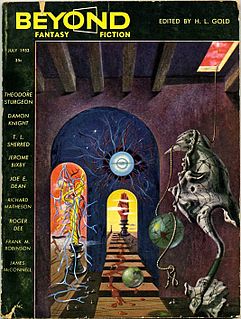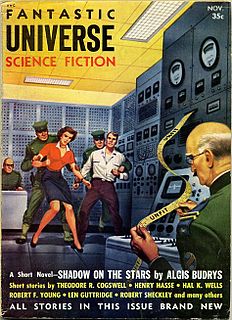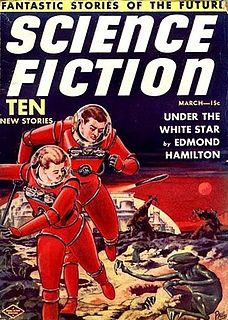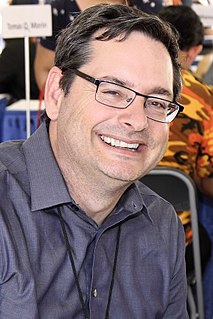
Galaxy Science Fiction was an American digest-size science fiction magazine, published from 1950 to 1980. It was founded by a French-Italian company, World Editions, which was looking to break into the American market. World Editions hired as editor H. L. Gold, who rapidly made Galaxy the leading science fiction magazine of its time, focusing on stories about social issues rather than technology.

Lester del Rey was an American science fiction author and editor. He was the author of many books in the juvenile Winston Science Fiction series, and the editor at Del Rey Books, the fantasy and science fiction imprint of Ballantine Books, along with his fourth wife Judy-Lynn del Rey.

Judy-Lynn del Rey née Benjamin was a science fiction editor.

Unknown was an American pulp fantasy fiction magazine, published from 1939 to 1943 by Street & Smith, and edited by John W. Campbell. Unknown was a companion to Street & Smith's science fiction pulp, Astounding Science Fiction, which was also edited by Campbell at the time; many authors and illustrators contributed to both magazines. The leading fantasy magazine in the 1930s was Weird Tales, which focused on shock and horror. Campbell wanted to publish a fantasy magazine with more finesse and humor than Weird Tales, and put his plans into action when Eric Frank Russell sent him the manuscript of his novel Sinister Barrier, about aliens who own the human race. Unknown's first issue appeared in March 1939; in addition to Sinister Barrier, it included H. L. Gold's "Trouble With Water", a humorous fantasy about a New Yorker who meets a water gnome. Gold's story was the first of many in Unknown to combine commonplace reality with the fantastic.

Steven H Silver is an American science fiction fan and bibliographer, publisher, author, and editor. He has been nominated for the Hugo Award for Best Fan Writer twelve times and Best Fanzine five times without winning.

Other Worlds, Universe Science Fiction, and Science Stories were three related US magazines edited by Raymond A. Palmer. Other Worlds was launched in November 1949 by Palmer's Clark Publications and lasted for four years in its first run, with well-received stories such as "Enchanted Village" by A. E. van Vogt and "Way in the Middle of the Air", one of Ray Bradbury's "Martian Chronicle" stories. Since Palmer was both publisher and editor, he was free to follow his own editorial policy, and presented a wide array of science fiction.

Del Rey Books is a branch of Ballantine Books, which is owned by Random House and, in turn, by Penguin Random House. It is a separate imprint established in 1977 under the editorship of author Lester del Rey and his wife Judy-Lynn del Rey. It specializes in science fiction and fantasy books, and formerly manga under its Del Rey Manga imprint.

Beyond Fantasy Fiction was a US fantasy fiction magazine edited by H. L. Gold, with only ten issues published from 1953 to 1955. The last two issues carried the cover title of Beyond Fiction, but the publication's name for copyright purposes remained as before.

Fantastic Universe was a U.S. science fiction magazine which began publishing in the 1950s. It ran for 69 issues, from June 1953 to March 1960, under two different publishers. It was part of the explosion of science fiction magazine publishing in the 1950s in the United States, and was moderately successful, outlasting almost all of its competitors. The main editors were Leo Margulies (1954–1956) and Hans Stefan Santesson (1956–1960); under Santesson's tenure the quality declined somewhat, and the magazine became known for printing much UFO-related material. A collection of stories from the magazine, edited by Santesson, appeared in 1960 from Prentice-Hall, titled The Fantastic Universe Omnibus.

The Best of Philip K. Dick is a collection of science fiction stories by American writer Philip K. Dick. It was first published by Del Rey Books in 1977 as a volume in its Classic Library of Science Fiction. Many of the stories had originally appeared in the magazines Planet Stories, Fantasy and Science Fiction, Space Science Fiction, Imagination, Astounding Stories, Galaxy Science Fiction, Amazing Stories, Science Fiction Stories and Startling Stories, as well as the anthologies Dangerous Visions and Star Science Fiction Stories No.3.

Future Science Fiction and Science Fiction Stories were two American science fiction magazines that were published under various names between 1939 and 1943 and again from 1950 to 1960. Both publications were edited by Charles Hornig for the first few issues; Robert W. Lowndes took over in late 1941 and remained editor until the end. The initial launch of the magazines came as part of a boom in science fiction pulp magazine publishing at the end of the 1930s. In 1941 the two magazines were combined into one, titled Future Fiction combined with Science Fiction, but in 1943 wartime paper shortages ended the magazine's run, as Louis Silberkleit, the publisher, decided to focus his resources on his mystery and western magazine titles. In 1950, with the market improving again, Silberkleit relaunched Future Fiction, still in the pulp format. In the mid-1950s he also relaunched Science Fiction, this time under the title Science Fiction Stories. Silberkleit kept both magazines on very slim budgets throughout the 1950s. In 1960 both titles ceased publication when their distributor suddenly dropped all of Silberkleit's titles.
Science Fiction Adventures was an American digest-size science fiction magazine, published from 1952 to 1954 by Science Fiction Publications. It was edited by Lester del Rey, under the pseudonym "Philip St. John", and was targeted at a younger audience than its companion magazine, Space Science Fiction. Contributors included Algis Budrys, Raymond Z. Gallun, Robert Sheckley, and del Rey himself, who published his novel Police Your Planet under the pseudonym "Erik van Lhin". Damon Knight contributed a book review column beginning with the fifth issue. Cyril M. Kornbluth's novel The Syndic was serialized in 1954. Artwork was provided by H.R. van Dongen, Kelly Freas, and Paul Orban, among others.

Seekers of Tomorrow: Masters of Modern Science Fiction is a work of collective biography on the formative authors of the science fiction genre by Sam Moskowitz, first published in hardcover by the World Publishing Company in 1965. The first paperback edition was issued by Ballantine Books in October, 1967. A photographic reprint of the original edition was issued in both hardcover and trade paperback by Hyperion Press in 1974. Most of its chapters are revised versions of articles that initially appeared in the magazine Amazing Stories from 1961-1964.

Daryl Gregory is an American science fiction, fantasy and comic book author. Gregory is a 1988 alumnus of the Michigan State University Clarion science fiction workshop, and won the 2009 Crawford Award for his novel Pandemonium.

Souls in Metal: an Anthology of Robot Futures is an anthology of robot-themed science fiction short stories edited by Mike Ashley. It was first published in hardcover by Robert Hale in February 1977 in the United Kingdom, with an American hardcover edition following from St. Martin's Press in June of the same year, and a paperback edition from Jove/HBJ in June 1978.

Invasions is an anthology of science fiction short stories edited by Isaac Asimov, Martin H. Greenberg and Charles G. Waugh as the tenth and last volume in their Isaac Asimov's Wonderful Worlds of Science Fiction series. It was first published in paperback by Roc/New American Library in August 1990, with the first British edition issued in paperback by Robinson at the same time.

Ballantine's Classic Library of Science Fiction is a series of speculative fiction collections originally published in the 1970s and 1980s purporting to gather together the career-best short works of a selection of authors then prominent in the field. The series was conceived and published in paperback by Ballantine Books, though most of the early volumes also had initial hardcover editions issued by Doubleday's Science Fiction Book Club preceding the Ballantine/Del Rey paperback editions. A number of volumes were subsequently reprinted, both by the original and later publishers.

The Best of Frederik Pohl is a collection of science fiction short stories by American author Frederik Pohl, edited by Lester del Rey. It was first published in hardcover by Nelson Doubleday in March 1975 as a selection of its Science Fiction Book Club, and in paperback by Ballantine Books in June of the same year as a volume in its Classic Library of Science Fiction, and reprinted in April 1976. The book was reissued in hardcover by Taplinger in 1977. The first British edition was issued in Hardcover in January 1977 by Sidgwick & Jackson, which later gathered it together with The Best of Harry Harrison (1976) into the omnibus volume Science Fiction Special 29 (1978). It has also been translated into Italian and [[German language|German.

The Best of C. M. Kornbluth is a collection of science fiction and fantasy short stories by American author C. M. Kornbluth, edited by Frederik Pohl. It was first published in hardback by Nelson Doubleday in October 1976 and in paperback by Ballantine Books in January 1977 as a volume in its Classic Library of Science Fiction. A second hardcover edition was issued by Taplinger in November 1977, and an ebook edition by Faded Page in December 1917.
















